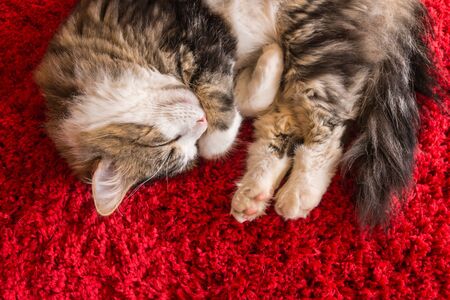Understanding Normal Cat Odor
When you share your home with a cat, especially in a cozy farmhouse setting, it’s natural to notice that every pet comes with their own unique scent. Typically, a healthy cat has only a faint, earthy aroma—think of soft hay or the gentle musk of sun-warmed fur after an afternoon nap in the barn window. This subtle pet smell is nothing to worry about; it’s just part of life with animals and can even add to the charm of rural living. As long as your kitty’s scent isn’t overpowering or unpleasant, you’re likely experiencing what most cat parents do on a daily basis: the comforting, familiar presence of a happy, healthy companion. So before you worry about any odor, remember that a slight animal smell is not only normal but often expected in homes filled with pets and surrounded by nature.
Common Causes of Foul Smells
If you’ve ever come in from mucking out the chicken coop only to be greeted by a whiff of something less than fresh coming from your feline friend, you’re not alone. Cats are usually fastidious groomers, but even the most pampered barn cat can sometimes develop a bit of a stink. Here are some down-home reasons why your kitty might smell bad, just like that pair of boots you left on the porch after a muddy day.
Dental Issues: More Than Just Bad Breath
Just like Uncle Joe after a big plate of BBQ ribs, cats can get some serious bad breath if their teeth and gums aren’t in top shape. Dental disease is one of the most common causes of foul odors in felines. Plaque and tartar build-up, gum infections, or even an abscessed tooth can all make your kitty’s kisses less than welcome.
Dirty Fur: Country Messes Happen
If your cat roams outdoors—maybe prowling through hay bales or rolling around under the tractor—she might end up with dirt, manure, or all sorts of farmyard treasures stuck to her fur. Sometimes, older cats or those with health issues don’t groom as well as they should, leaving them with greasy or matted coats that trap odors.
Litter Box Mishaps: The Usual Suspect
Let’s face it—nothing says “country living” quite like wrangling with a stubborn litter box. If your cat is tracking litter on her paws or getting a bit messy during her bathroom breaks, she could carry those smells around with her. A dirty box is also more likely to lead to accidents outside the box, which only adds to the aroma.
Quick Reference Table: Common Causes & Signs
| Cause | Typical Signs | Country Living Example |
|---|---|---|
| Dental Issues | Bad breath, drooling, pawing at mouth | Like grandpa after sweet tea and pie without brushing his teeth |
| Dirty Fur | Greasy coat, visible dirt/mud, matting | Cats rolling in garden beds or napping in dusty barns |
| Litter Box Problems | Paws smell, fur stained near tail, strong odor when cat walks by | Kitties tracking litter through the mudroom after a bathroom break |
Remember:
A little country grime is part of rural life—but if your kitty’s smell lingers longer than last night’s campfire smoke, it may be time for a closer look at what’s causing those odors.

3. When a Bad Smell Signals a Health Issue
If you’ve noticed that your cat’s odor seems especially strong or just plain “off,” it’s important to pay attention—sometimes, that stinky scent is more than just a messy fur coat. Certain smells can be red flags for health problems, and being a pet parent means knowing when to sniff out trouble.
Common Clues That Something Isn’t Right
Cats are usually pretty good at keeping themselves clean, so persistent odors often mean something is up. Here are some tell-tale signs:
- Strong, fishy smell near the rear: This can be a sign of anal gland issues—a common but uncomfortable problem for kitties.
- Foul breath (not just tuna breath!): Dental disease or infections in the mouth can cause really bad breath.
- Yeasty or musty skin odor: Skin infections, allergies, or parasites might be to blame if your cat’s fur or skin smells strange.
- Sour or ammonia-like urine odor: Urinary tract infections or kidney problems can change how your cat’s pee smells.
Other Symptoms to Watch For
If your kitty’s stinkiness comes with other symptoms—like scratching, licking one spot constantly, swelling, bald patches, discharge, or changes in appetite—it’s time to take action. These clues help you (and your vet) figure out what’s going on under all that fluff.
Don’t Wait to Get Help
If you suspect there’s more than just everyday dirt causing your cat’s smell, don’t wait for things to get worse. A quick visit to the vet can make all the difference for your feline friend’s comfort and health—and get your home smelling fresh again!
4. Home Solutions and Freshening Up Tips
If your feline friend has started to smell less like fresh hay and more like a muddy barn, don’t worry—there are gentle, country-inspired ways to help your cat get back to being the pride of your homestead. Here are some easy, at-home routines that can make a big difference.
Regular Brushing: The First Line of Defense
Just as we’d groom our horses or brush out our loyal pups after a romp in the fields, cats benefit from regular brushing too. Not only does it help remove dirt and loose fur, but it also cuts down on oily buildup that can lead to odors. Long-haired breeds especially need frequent attention, but even short-haired kitties appreciate a good once-over.
Brushing Routine Table
| Cat Type | Recommended Brushing Frequency | Tool Suggestion |
|---|---|---|
| Short-Haired Cat | 1-2 times per week | Soft bristle brush |
| Long-Haired Cat | Every other day | Slicker brush or comb |
| Sensitive/Senior Cat | As tolerated, gently | Padded glove brush |
Country-Style Baths: Less Is More
Cats aren’t fans of water—most prefer chasing butterflies over bath time! But sometimes, especially if your kitty’s been exploring the chicken coop or rolling in who-knows-what, a bath is necessary. Use a mild, pet-safe shampoo with warm (not hot!) water. Only bathe when truly needed, as over-bathing can dry out their skin and make things worse. Think of it as a rare barn cleaning rather than a weekly chore.
Fresh Bedding Swaps: Cozy Up Their Space
If you share your home with multiple pets (like we do with our dogs and rabbits), bedding can quickly gather fur, dander, and outdoor smells. Wash your cat’s blankets and beds weekly in unscented detergent to keep things smelling like clean laundry and sunshine. If you have an outdoor line, hang bedding outside for that extra-fresh country scent.
Bedding Freshness Checklist:
- Weekly wash with unscented detergent
- Rotate between two sets for constant freshness
- Avoid harsh chemicals or strong fragrances
- Shake out bedding outdoors to remove dust before washing
- Let dry in sunlight when possible for natural odor control
By weaving these simple routines into your daily life, you’ll help your cat stay sweet-smelling—and keep your home feeling like the cozy farmhouse haven both you and your pets love.
5. When to Call the Vet
Sometimes, a little barnyard funk is just part of farm life, but there are certain signs you should never ignore when it comes to your cat’s health. If your feline friend’s odor sticks around even after a good brushing or bath, it’s time to take things seriously. Watch out for other red flags like drooling, sores around the mouth, difficulty eating, limping, or changes in appetite or behavior. Persistent bad breath that smells sweet or like ammonia can be a sign of serious problems like diabetes or kidney disease. Pay attention to discharge from the ears, eyes, or nose—these could mean infections that need professional treatment. If you notice your cat scooting their bottom on the ground, yowling in pain when using the litter box, or if they have diarrhea or blood in their stool, bundle up your barn cat and head straight to the vet. Even outdoor kitties who seem tough as nails can hide illness until it’s advanced. Trust your gut: if something feels off or your pet’s smell is suddenly overwhelming and doesn’t improve with basic care, don’t wait—call your veterinarian for help. Early intervention can keep your country companion healthy and happy for many more seasons together.
Nurturing a Fresh and Happy Cat
Maintaining a sweet-smelling, healthy kitty isn’t just about regular baths or fancy sprays—it’s about building daily habits that support good hygiene, a clean home, and a loving bond with your furry friend. Whether you’re managing a lively multi-pet household on a sunlit farm or sharing a cozy city apartment with your cat crew, these simple routines make all the difference.
Keep Up with Grooming
Brushing your cat every few days removes loose fur and dirt, reduces shedding, and helps you spot any skin issues before they become smelly problems. Even short-haired kitties benefit from this bonding time! For long-haired breeds or cats who love to explore outdoors, more frequent brushing is even better.
Litter Box Love
Scoop litter boxes at least once daily and give them a thorough wash each week. Place boxes in well-ventilated spots and use high-quality, odor-controlling litter. In homes with multiple pets, provide one box per cat plus one extra—this keeps everyone happy and your house smelling fresh.
Clean Spaces, Happy Faces
Vacuum pet beds, blankets, and favorite nap spots regularly. Wash soft items in fragrance-free detergent to keep odors at bay without overwhelming sensitive feline noses. A quick wipe-down of food bowls and water dishes every day ensures no funky smells linger around mealtime.
Strengthen Your Multi-Pet Bond
Cats thrive when they feel secure and loved, especially in households bustling with both paws and hooves. Spend quality time playing, cuddling, or simply relaxing together. Positive attention helps reduce stress-related grooming issues (like over-grooming or avoiding the litter box) that can lead to unpleasant odors.
Home Sweet Home—Farm or City
No matter where you live, fresh air does wonders for everyone! Open windows when weather allows or use air purifiers to help circulate clean air inside. Sprinkle some baking soda on carpets before vacuuming for an added boost of freshness.
By nurturing good habits and keeping your living space tidy, you’ll enjoy the company of contented, clean-smelling cats—and deepen the special connection you share across your whole animal family.


